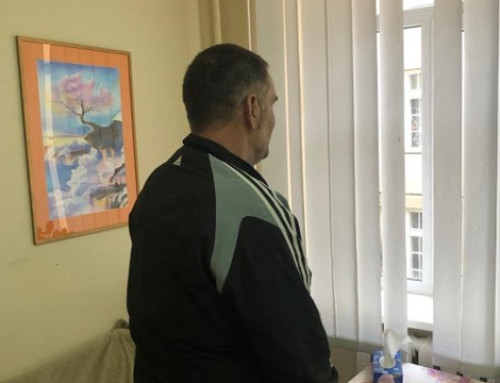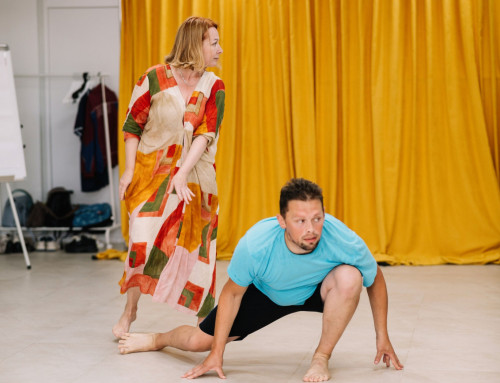Striving ‘To Be Free‘: The Lives of Internally Displaced Girls with Disabilities
This article was published in Ukrainian and then translated into English.
Since 2017, ‘Fight for Right,’ an organization dedicated to supporting Ukrainians with disabilities, has provided humanitarian aid, legal and psychological assistance, and opportunities to foster personal growth. With the onset of Russia’s full-scale invasion, their emergency response team, titled ‘Support and Protection,’ began offering evacuation help along with targeted assistance in obtaining assistive technologies. Through a partnership between ‘Fight for Right’ and ‘Austausch,’ we continue to share the stories of internally displaced Ukrainian women and those with disabilities affected by the conflict.
To address the ongoing devastating impacts of Russia’s full-scale war on Ukraine—especially on internally displaced individuals with disabilities—various initiatives have been launched over the past two years to support those with intellectual and psychosocial disabilities. Among these efforts, a significant focus has been the development and implementation of independent living services within communities.
This article explores the transformed lives of individuals with intellectual and psychosocial disabilities who have transitioned from institutional care to supported living arrangements. We will look into their past experiences in institutions, their journey towards independent living, their adaptation to new environments, and their hopes for the future.
As reported by the National Social Service of Ukraine on January 1, 2023, the country’s social protection system includes 260 boarding schools catering to the elderly, adults with disabilities, and children with disabilities, alongside psychoneurological institutions—excluding those under occupation1. Around 41,800 people are housed in these facilities2. The stark contrast between life in residential institutions and community-based independent living stems from the limitations imposed on residents’ autonomy. In institutions, individuals are often unable to make personal decisions, choose their living arrangements, or break away from a strict daily schedule. Many of these residents are people with intellectual and/or psychosocial disabilities.
Studies from abroad demonstrate that transitioning from institutional care to community settings significantly improves the lives of people with intellectual and psychosocial disabilities. This change notably enhances their quality of life, increases their opportunities for making choices, and broadens their access to community services and activities.3 4
Importantly, the UN Convention on the Rights of Persons with Disabilities affirms the right of individuals with intellectual and psychosocial disabilities to live within the community. According to this Convention, any form of discrimination or segregation against people with disabilities is a violation of their human rights.
This past winter, I had the opportunity to visit several supported living facilities managed by the public organization “Dream Workshop” in Lviv.
Dream Workshop’s supported living service offers both apartments and houses to adults with disabilities, aged 18 and older. These services include comprehensive support in developing self-care abilities, housekeeping skills, and medical oversight, in line with the Ministry of Social Policy Order No. 956, which approves the State Standard of Social Services for Supported Accommodation for the Elderly and Persons with Disabilities.
In response to Russia’s full-scale invasion, Dream Workshop has successfully established new homes for young adults with intellectual disabilities, aged 18 to 40, who had previously resided in a variety of boarding schools, hospitals, and sanatoriums.
These modern facilities are located in well-maintained areas near Lviv’s center, providing residents easy access to local shops, restaurants, social services, and parks—factors that greatly contribute to a comfortable and sociable living environment.
In one of these homes, I met two young women who, despite sharing similar backgrounds of intellectual challenges, complicated family relationships, long periods in institutional care, and displacement due to the ongoing conflict, have each found unique paths to integration and inclusion in the community after being designated as ‘internally displaced persons.’
Maryna’s story
Maryna, a 21-year-old from Kharkiv, resides in a supported housing facility operated by “Dream Workshop.”
She comes from a large family, with six siblings. She seldom discusses her childhood or the people who were close to her during those years.
Maryna attended a specialized school5 and later trained as a chef. Despite her qualifications, she faced significant challenges in securing employment. She often heard, “You’re too young, come back later.” despite being an adult. For equal access to employment, individuals with intellectual and psychosocial disabilities should receive support and reasonable accommodations. This might include assistance from a social worker, a phased introduction to the workplace, and opportunities to grasp job responsibilities. In Ukraine, only a handful of initiatives or public organizations, such as “Emaus: Support Center for People with Special Needs” and “Good Bread from Good People,” focus on employing people with intellectual disabilities.
After reaching adulthood, Maryna lived in a psychiatric hospital in Kharkiv. She is reluctant to discuss her experiences there, only mentioning that she felt uncomfortable and missed her family. However, Maryna now asserts confidently that she will not return home, believing that her mother “does not need me.”
A pivotal moment in her life occurred with the onset of the full-scale Russian invasion of Ukraine. In the early days of the conflict, patients from the psychiatric hospital, including Maryna, were evacuated to the Lviv Regional Clinical Psychiatric Hospital. This was Maryna’s first time leaving Kharkiv; she traveled by train and found herself in an unfamiliar institution in Lviv.
Maryna remembers, “The hospital was dreadful. I was scared. I longed to go home and did not want to remain there.”
In the spring of 2023, the Dream Workshop team began seeking residents for their first supported living facility and encountered Maryna. The decision for her to move into the facility followed several meetings aimed at better understanding each other.
In May 2023, Maryna transitioned out of the institutional care system and moved into the supported facility. She also started participating in a day support workshop for people with intellectual disabilities, facilitated by Dream Workshop.
Anzhelika’s Story
Anzhelika is an 18-year-old resident of the supported housing facility run by “Dream Workshop,” originally from the Kherson region.
Before the full-scale invasion, she attended a specialized boarding school and had minimal contact with her family. She has since reconnected with her sisters who remain in the Kherson region, though her relationship with her mother, who struggles with alcohol addiction, remains strained.
Anzhelika admits she has few memories of her early childhood. Her recollections begin with her mother’s poor treatment and her time at the boarding school. When comparing her home life to her school experience, she reflects that she felt more supported at school, where she had friends, supportive teachers, and engaging classes. While positive experiences like hers are rare in boarding schools, it’s important to recognize that these institutions often have dedicated staff who nurture and support the children, providing regular meals and material support. However, children in such settings miss out on everyday experiences and interactions that their peers outside these institutions often take for granted.
After February 24, 2022, Anzhelika, her younger brother, and their foster family were evacuated to Germany. Before reaching adulthood, however, Anzhelika and her brother returned to Ukraine. Her brother was adopted by another family, and Anzhelika moved to the Bukovo boarding school in the Lviv region. She quickly adapted to her new environment, forming friendships and beginning to assist the staff with caring for girls with complex needs. She recalls, “I watched over the children and rushed to attend to the bedridden in another building. At four o’clock in the morning, I would help the immobile residents, lifting them from their beds and placing them in wheelchairs. Throughout the day, I’d be constantly on the move… and by evening, I’d assist them from their wheelchairs back to their beds… I could even carry a heavy man. I moved tirelessly like a tank, back and forth, back and forth.”
Interestingly, the tasks Anzhelika undertook are usually the responsibilities of nurses and teachers at the institution. While this was a role she chose for herself, her contributions were highly valued, especially given the often insufficient staffing levels in such institutions.
Last summer, Anna Ivanicheva, the founder of “Dream Workshop,” along with her team, visited Bukovo to meet the residents of the boarding school. Anzhelika immediately and decisively chose to live in a supported house to “be free.” Anna recalls the initial visit: “We had preliminary discussions with the headmaster, who recommended several girls. On our first visit to the boarding school at Bukovo, we were given a tour. A group of girls followed us, each sharing a bit about themselves. Anzhelika was among them, and she made up her mind then that she wanted to join us. When we returned, it was specifically to see Anzhelika.”
Since September 2023, Anzhelika has been living in the supported housing facility. She shares a room with Maryna. For the first time in a long while, she feels settled and secure, with no desire to return to her family: “I don’t want to go back to Kherson. That life belongs to them, not to me. I feel good and at peace here in Lviv.”
“I want to be together”: The Lives of Maryna and Anzhelika in a Supported Living House
The girls share the house with four other male residents and assistants. The ground floor features a common area where the young residents eat, socialize, watch movies, or play board games. Maryna notes that she became much happier and more relaxed after Anzhelika arrived. Together, they assist each other with daily tasks, attend workshops where they craft handmade products like candles, and engage in learning and communication activities.
Thanks to the support services in the house, the girls have had new experiences: they washed their clothes, cooked dinner independently, and visited a beauty salon and museum for the first time. They have enjoyed the freedom to choose their clothing, food, jewelry, leisure activities, waking times, and how they spend their free time.
Maryna proudly shared her personal belongings with me—her jewelry, personal care products, and toys—all neatly stored and accessible for her use whenever she wishes.
During our conversation, the girls discussed their past, present, and future aspirations. They have a clear vision of how they wish to live and the dreams they hope to achieve. Both girls express a desire to continue living in the Dream Workshop house and to pursue professional careers—Maryna aspires to work in healthcare, specifically treating military personnel, while Anzhelika dreams of becoming a painter.
I am hopeful that the trend of establishing homes in Ukraine where people with intellectual and psychosocial disabilities receive the support they need to lead fulfilling lives and chase their dreams will continue to flourish.
Hanna Zaremba-Kosovych,
researcher of disability studies
Footnotes
- Harchenko, V., Fedorovych, I., Avtukhov, K., Tarasova, M., Prashko, O., & Temchenko, O. (2023). Invisible victims of war: people in places of deprivation of liberty. Fight For Right. Retrieved from https://ffr.org.ua/wp-content/uploads/2023/06/Summary-of-the-analytical-report-Invisible-victims-of-war-people-in-places-of-deprivation-of-liberty.pdf
- Ibid., p.18
- Cameranesi, M., Chimney, K., & Shooshtari, S. (2022). Changes in the quality of life of persons with profound intellectual and multiple disabilities following community transition: A Canadian study. Research in Developmental Disabilities, 131, 104360. https://doi.org/10.1016/j.ridd. 2022.104360
- Werner, S., Holler, R. (2023) Israeli social workers’ recommendations on residential settings for individuals with intellectual disabilities. Journal of Applied Research in Intellectual Disabilities, 1–10. https://doi.org/10. 1111/jar.13167
- The Soviet system of institutionalizing people with disabilities was closely linked to the system of special education, which utilized a medical approach and correctional pedagogy methodology. Many schools for children with disabilities were established, categorized by disability type such as visual impairment, hearing impairment, intellectual disability, speech impairment, and others. This system persisted even after Ukraine regained its independence, evolving into what are now known as educational and rehabilitation centers.








